IN FOCUS: Are PC cafes making a comeback in Singapore?
Their numbers have dwindled significantly over the years. But cybercafes are still around and have potential as another third place in society, experts say.
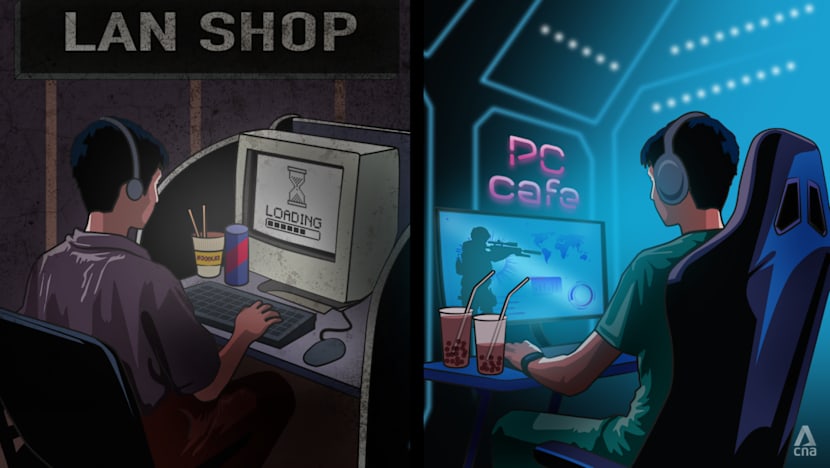
PC cafes in Singapore today are doing away with the traditional LAN shop image, offering private rooms, premium gaming equipment and even bubble tea. (Illustration: CNA/Rafa Estrada)

This audio is generated by an AI tool.
SINGAPORE: In their secondary school and polytechnic days, Leo Rui Yan and Jaden Chan used to frequent what Singaporeans referred to as LAN shops.
Standing for local area network, these places link up several computers to play multiplayer games, either through wireless or wired connections.
Ms Chan, now 30 years old, and Ms Leo, 28, would head over after school to spend two to three hours playing the likes of first-person shooter game Counter-Strike or dance and rhythm game Audition.
LAN shops were also the only avenue for Ms Chan, who otherwise had to fight off three brothers at home for a chance to use the single laptop they shared.
So when the two friends dropped by the newly opened PC cafe Haven in Kallang Wave Mall, they knew right off the bat that their experience was going to be dramatically different.
It was cleaner and more comfortable, with dedicated gaming chairs and top of the line equipment. There was also ample space for each gamer, unlike in the shops of yesteryear where everyone was "packed shoulder to shoulder".
Despite such perks, and even though they remain gaming enthusiasts, Ms Leo and Ms Chan visit these modern PC cafes only about once a year.
In Ms Leo's case, she has her own gaming setup at home, which she forked out thousands of dollars to put together some two years ago.
"If you're really into gaming, you will want your own setup. So naturally, you won't want to come to a LAN shop," she said.
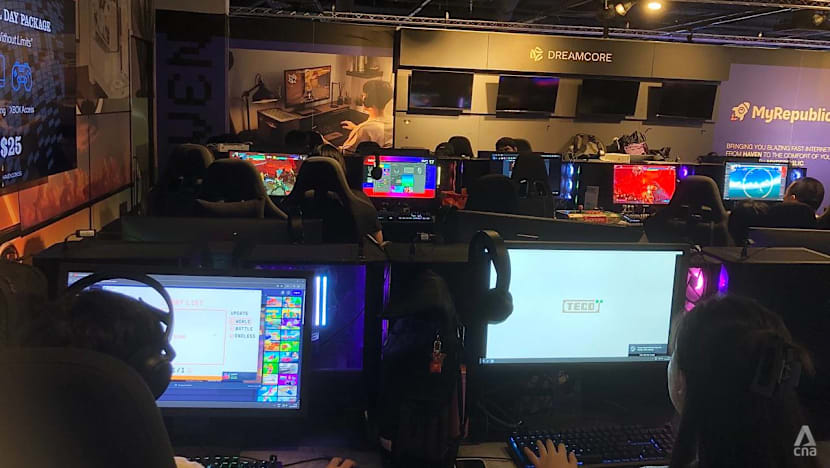
The prevalence of such gaming setups at home, not to mention the convenience of playing on mobile phones, have been cited as obvious factors in the declining interest in PC cafes and as a result, a declining number of outlets in Singapore.
Yet, a handful of veterans continue to stand the test of time by adapting and evolving. New players are also entering the market in recent years, armed with makeovers of the traditional LAN shop image and experience as well as ambitious plans for expansion, including beyond the island.
Toss in a national interest in esports and insiders will whisper that a PC cafe revival could be on the cards. And beyond gaming, they could even step forth as valuable social sanctuaries in a time of increasing isolation and disconnection.
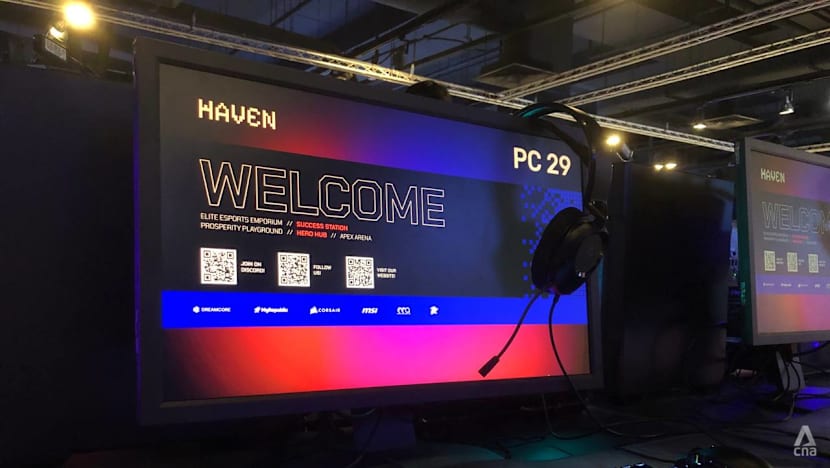
KILLED BY THE IPHONE?
While there are no official figures on the number of PC cafes in the past, interviews with industry stakeholders suggest at least 100 were up and running in the 2000s.
To set up a PC cafe, one must register with the Infocomm Media Development Authority (IMDA) and also secure a licence from the police to operate as a computer games centre.
Singapore now has 15 such computer games centres as of end-September this year, the police said in response to CNA's queries. That number has been relatively constant over the last three years, with 14 in 2022, and 16 in 2023 and 2024.
Under current licensing conditions, at least half of the space must be set aside for non-gaming purposes such as cafes or internet surfing.
Running a PC cafe today, however, also comes with the same challenges faced by other businesses - such as rental.
At the turn of the millennium, a 1,000 sq ft space could be rented for S$2,000 (US$1,540), according to Mr Brighton Yap, who opened his first cybercafe in 2003.
"You'll never find that now," he said.
He believes the decline in the LAN gaming industry can be traced to a historical moment: The release of the first iPhone, which sparked the smartphone revolution.
"When all these phones started coming out, they had app stores, games developed on those stores - and the games are free to play," said Mr Yap, who now owns the chain of Clique Gaming cafes.
The mobile game industry continues to grow. A Statista survey in the third quarter of 2024 found that more than 67 per cent of internet users worldwide played video games on smartphones, making it the most popular gaming device. PC gaming on laptops or desktops came in second at 34.7 per cent.
This can easily be done at home now, like Ms Leo has. It also means she avoids the little hassles at PC cafes, such as having to adjust the sensitivity of the computer mouse or register an account which she needs to log in and out of.
Still, gaming experts and business owners CNA spoke to stopped short of calling PC cafes a sunset industry.
Instead, it is one that's undergoing a reinvention, said Mr Yip Ren Kai, managing director and co-founder of esports and entertainment agency Redd+E.
"The way people engage with gaming spaces has changed. It is no longer just about renting a PC, but about being part of a gaming community and culture," he added, pointing to a new era driven by esports, content creators and hybrid entertainment venues.
Nanyang Polytechnic (NYP) senior manager Alvin Hoo, who oversees the creative media and technology cluster at the polytechnic's school of design and media, said that where LAN shops in the 2000s were filled with casual gamers seeking basic access to technology, today's PC cafes primarily serve competitive gamers and dedicated gaming enthusiasts.
The focus has shifted to creating curated gaming experiences and community engagement, he said.
"JUST GO PREMIUM AND DO GOOD STUFF"
That very approach emerged as a top of mind consideration for three new market entrants CNA spoke to.
Take Titans Esports Group, whose founder and CEO Elvin Toh was only 15 when he first thought of opening a PC cafe, after gaming competitively.
It took over two decades but the 43-year-old now owns five Titan Gaming outlets across Singapore, with another two in Kuala Lumpur and one in Bangkok.
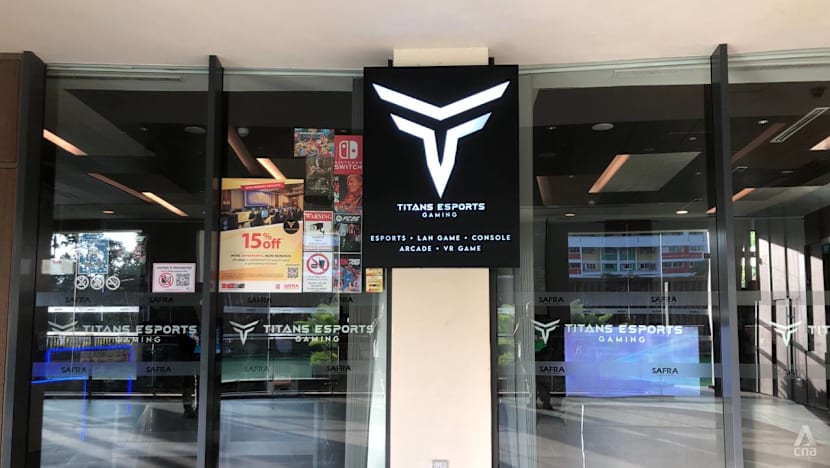
But Mr Toh doesn’t think of himself as running a PC cafe business: He refers to his outlets as esports arenas, and his vision is to drive esports in Asia.
To that end, he aims to build esports infrastructure throughout the region, starting with premium gaming PCs at his cafes and monitors installed with high-end graphics cards that can play games with the highest resolution.
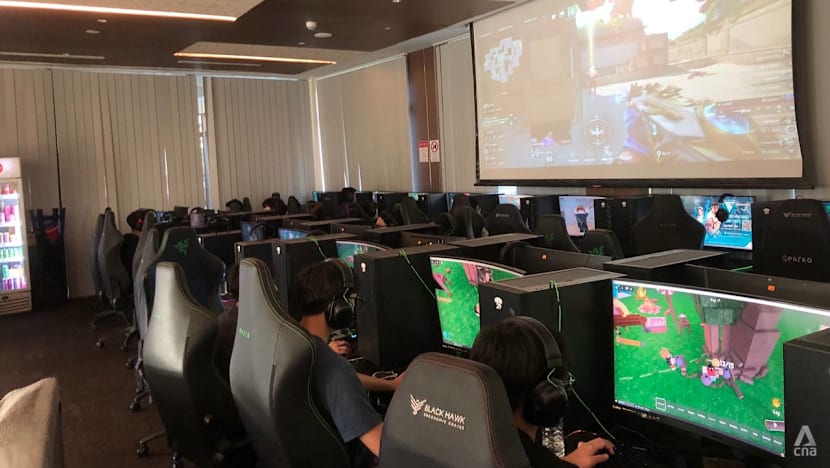
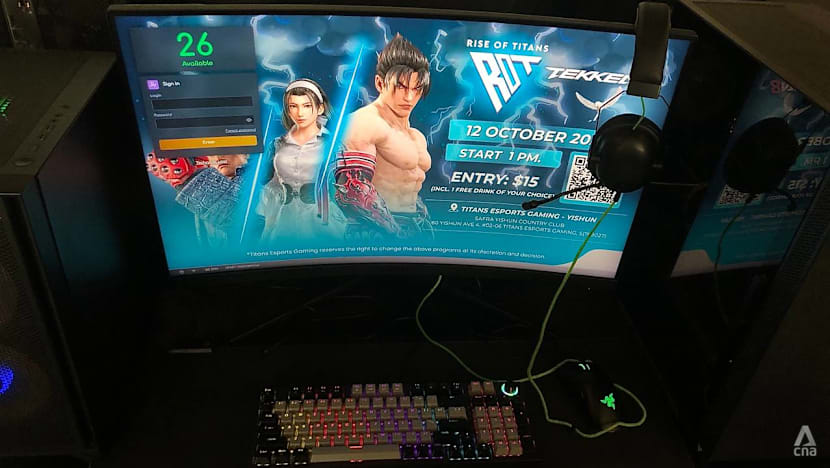
"All these setups are all esports-ready," said Mr Toh. "I don't set up like a traditional cyber cafe, where they go for all the budget setups."
He also sponsors esports players and teams, and runs competitive leagues and tournaments.
Ignite Gaming SG has also focused its energies on prioritising esports.
Its founder Lim Wei Yung is the owner of four bowling centres under the brand Sonic Bowl. When some of his interns expressed interest in participating in an esports tournament, he was inspired to convert space he had at the back of his bowling centre in SAFRA Punggol into a PC cafe.
This was initially run by another PC cafe brand, Reality Rift, which wound up last year. Mr Lim then took over and rebranded as Ignite Gaming.
The 31-year-old said he operates it not as an entry-level PC cafe, pointing to the inclusion of professional gaming monitors in a private room.
"The business strategy here is to just go premium and do good stuff, like good gaming experience," he added.
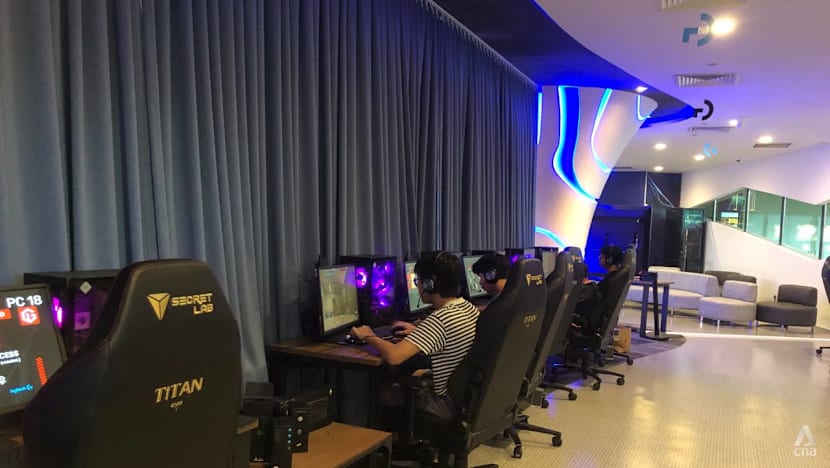
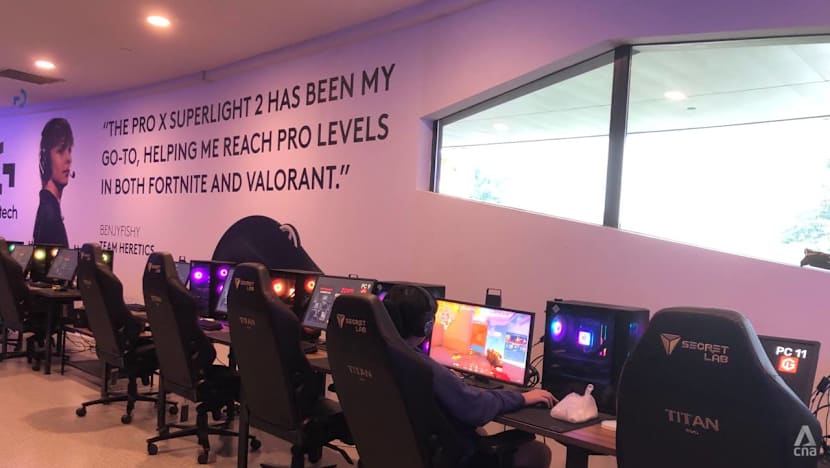
Mr Lim's target audience is youths who are considering going professional but do not own a gaming setup.
Ignite Gaming has also hosted esports tournaments, and caught the attention of corporate partners like computer peripherals manufacturer Logitech.
It has since acquired two professional esports teams – one for the Mobile Legends game and another for Valorant.
Mr Lim also plans to integrate another PC cafe into another of his bowling centres, though he did not reveal which.
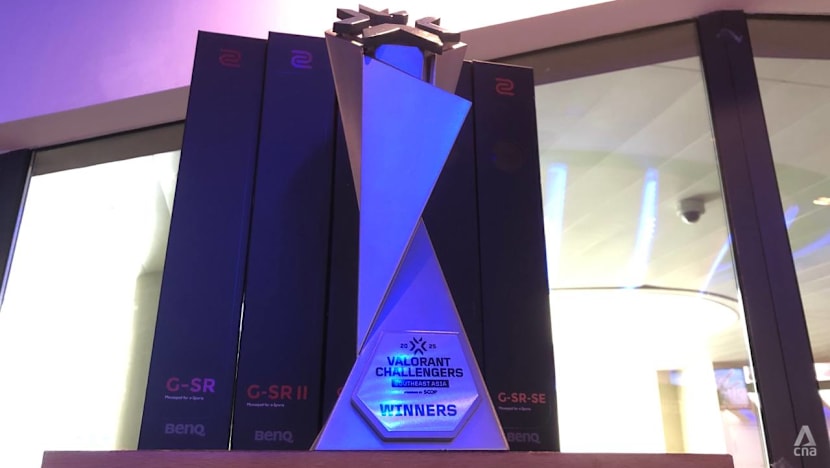
Then there's the Elixir Esports chain, which launched last year though it started out in a different incarnation back in 2015.
It was called Galaxy Gaming then, and had teamed up with Chinese chain Wanyoo Esports to open two PC cafes in Singapore, though the partnership ended in 2022.
Founder Allen Zhao, a Chinese national who has been in Singapore for 16 years, said consumers here and throughout Southeast Asia still love their PC games, which he believes lets players show off skills in a way that mobile games cannot.
But gamers in Singapore lacked an ideal environment to do so, he said.
"The culture of LAN in Singapore (was) quite old-fashioned," he said, observing that shops in the past simply provided a space for gaming, which was often darkened and not conducive for long hours of play.
Elixir Esports aims to shake that up with a focus on service - staffers greet customers at its outlets - and an in-house food and drinks menu which includes bubble tea and smoothies.
Private rooms are also available – for solo players, couples and groups of up to five people – and they come with blankets, slippers and toothbrushes.
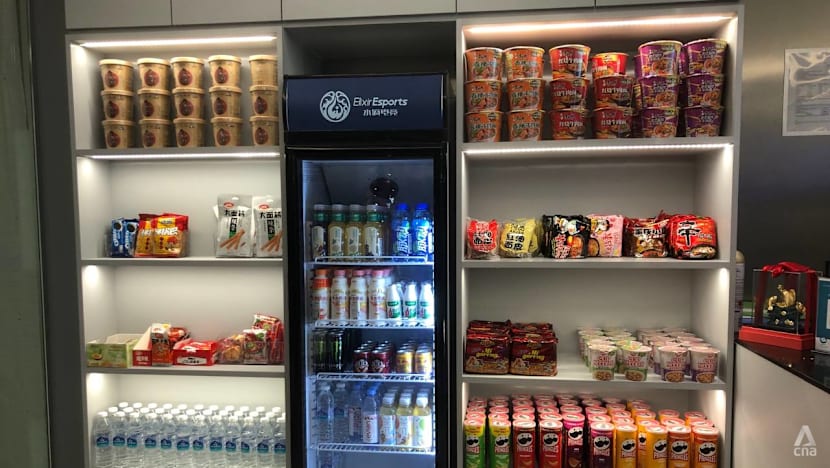
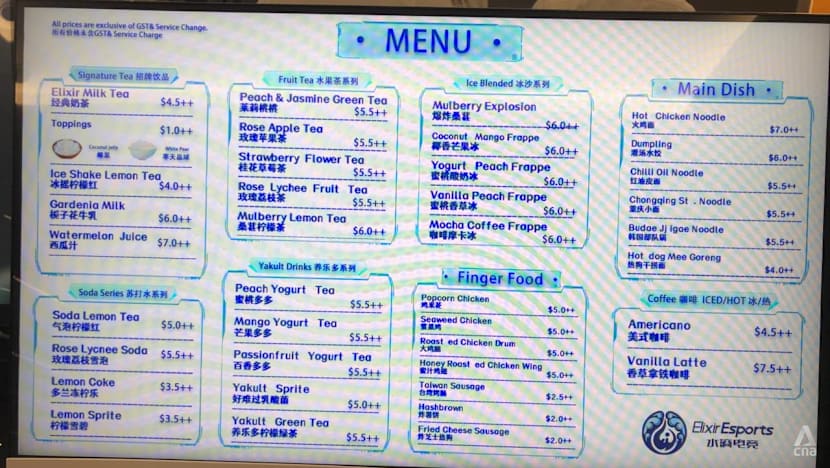
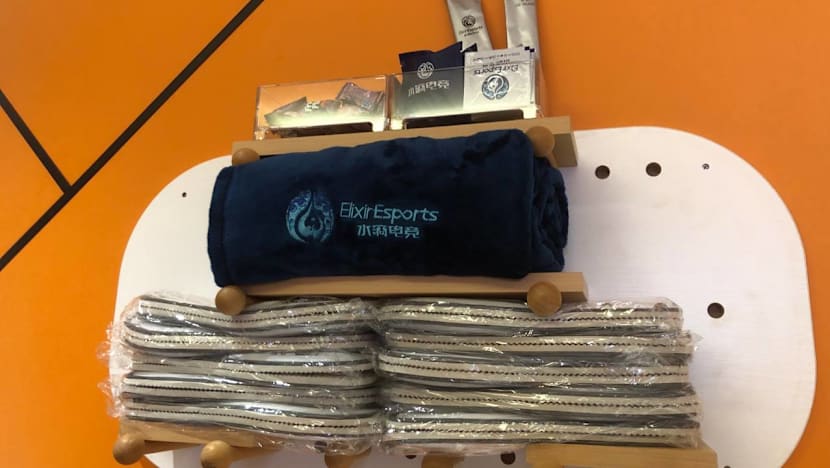
Elixir Esports has four outlets under its name, with its newest and flagship opening in The Cathay in July. A fifth outlet will open in Clarke Quay early next year, said Mr Zhao.
He wants to expand quickly and apply for an initial public offering (IPO), riding on what he sees as the Singapore government's supportive stance for esports through the hosting of multiple global tournaments.
“They can also see this trend ... they also want to build up the ecosystem for esports,” added Mr Zhao.
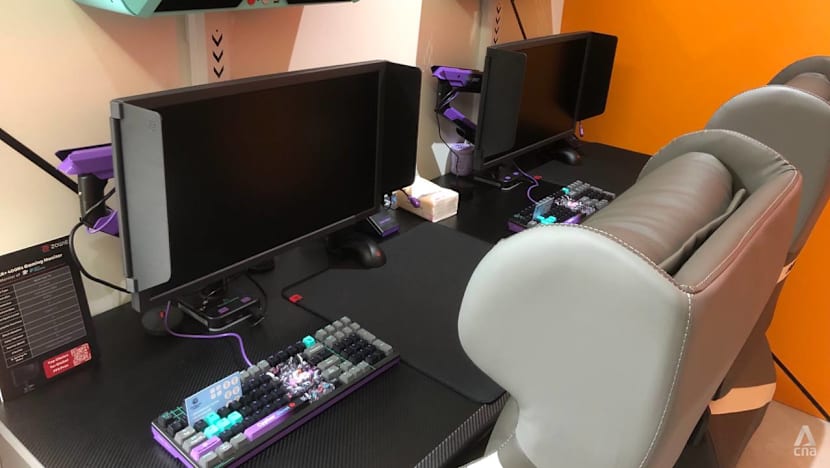
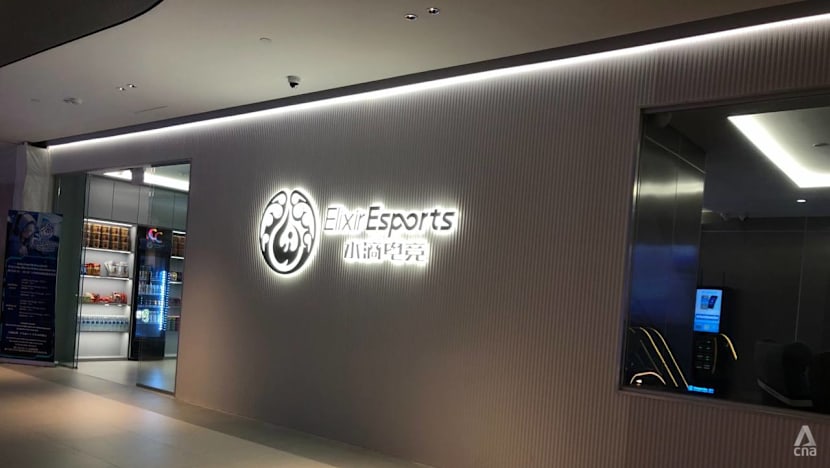
"BECOME A MULTI-ENTERTAINMENT THING"
Meanwhile veteran names like Clique Gaming and Good Speed Game Cafe have also moved with the times, though in their case it has been to look beyond PC gaming.
Over the past five years, with the COVID-19 pandemic and rising costs of living, Good Speed supervisor Alan Tee noticed that customers' PC gaming sessions were becoming shorter and shorter.
The cafe, which has been around since 2001, had to reduce its PC count from 100 to just over 30. It now also offers board games, consoles and social deduction games - a genre where players attempt to uncover each other's hidden role.
"We realised that if we wanted to stay relevant, we couldn’t just be about PCs; we had to be about people," said Mr Tee. "It’s more community-driven than purely LAN-based these days."
Clique pivoted to cuesports in 2021, with a dedicated billiards club in SAFRA Jurong. Other Clique outlets - including one which opened just late last month in the HomeTeamNS Bedok Reservoir Clubhouse - come with pool tables and PlayStation consoles.
Founder Mr Yap said that up until 2018, his business was primarily PC-focused, with about 80 to 90 per cent of sales from LAN gaming. Now, cuesports brings in about 60 per cent of sales, with revenue from PCs going down to around 15 to 20 per cent.
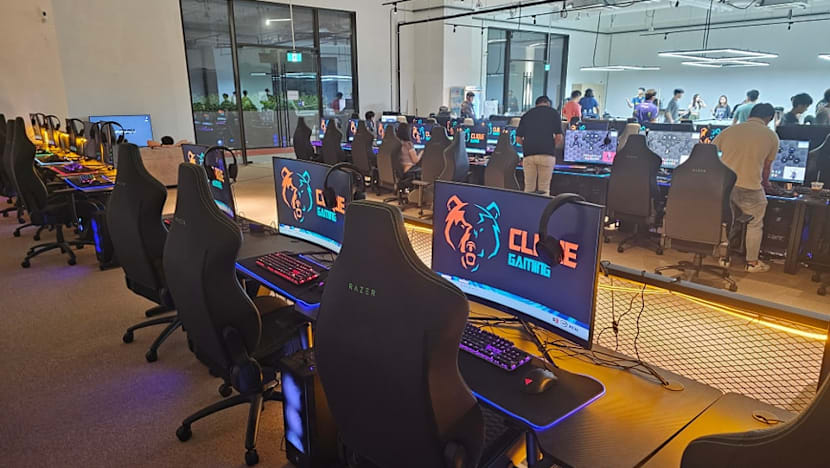
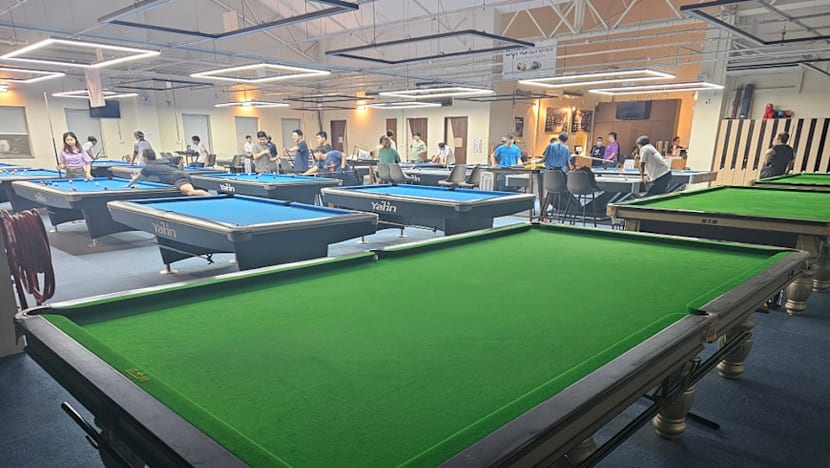
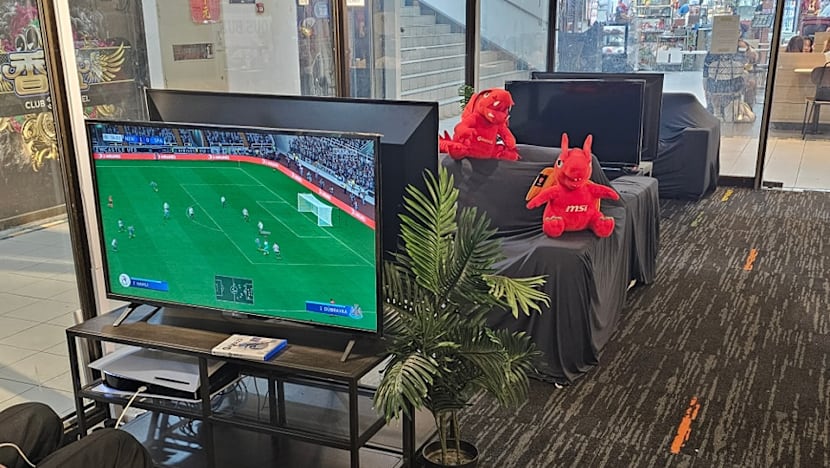
"(We) became a multi-entertainment thing. That is how we survive," said Mr Yap, who noted that SAFRA, where several of his outlets are based, also promotes Clique as a family entertainment provider.
"They don't primarily pigeonhole us into 'this is just a LAN shop'. We don't want to be known as that also."
Asked why he continues to offer PC gaming, he said: "We are very versatile, we are a company that always goes into trends .. So if let's say PCs still have some demand, we will always have some PCs."
MAKING IT STICK
Experts contrasted the Singapore scene with that in countries such as South Korea, China and even closer to home in Malaysia, Vietnam and the Philippines, where PC cafe and gaming culture is deeply rooted and thriving.
Esports is a national agenda in these countries, and there are many "hungry" people who want a chance to play competitively or with their friends in a physical setting, noted the president of the Singapore Cybersports & Online Gaming Association (SCOGA) Dennis Ooi.
It's a different story in Singapore, where esports is still not viewed as something "to bring people together", he added.
Still, there are efforts to create career pathways for interested youths, on top of inter-school competitions, professional leagues and continued big-ticket events on the calendar.
To draw these youths to public gaming spaces, Redd+E's Mr Yip emphasised the need to make them fun, social and meaningful; instead of just functional.
Either way, companies will have to come up with their own strategies to make it work, said Mr Ooi. "You need to find that glue to make it sticky for people to want to come down regularly."
Doors have opened at the Resorts World Convention Centre for one of the world's biggest e-sports tournaments. BLAST is set to host over 10,000 fans in Singapore, with more than half coming from abroad. This is the first time one of e-sports' highest-profile events is held in Singapore. All of the footage has to go from Singapore to over 150 territories across the world. It also has to be translated into 28 languages. Nicolas Ng meets some fans and finds out what it takes to produce the event.
A key aspect in actually "coming down" to PC cafes is the in-person element, with its attendant social benefits.
Research has found that proximity and easy access to gaming devices, for instance in the bedroom, can be a potential risk factor contributing to youths developing excessive gaming habits, compared to having such devices in common areas.
Dr Choo Hyekyung, a youth gaming researcher who conducted the study with her team, said PC cafes on the other hand can help youths - and for that matter, seniors as well - gel over shared interests, and build and strengthen friendships both offline and online.
That's not to say that overly frequent visits won't lead to problematic gaming habits.
Youths should thus strike a delicate balance by approaching visits to PC cafes as opportunities to interact face-to-face with fellow gamers, rather than focusing solely on the gaming itself, said Dr Choo, an associate professor in the department of social work at the National University of Singapore.
"Emphasising the social dimension can help maximise the benefits of gaming."
Mr Yip said "the heart of gaming has always been about the community".
"Devices may change, but the desire to connect, compete and share experiences hasn’t," he added. "For a long time, gaming was viewed as an individual activity, but the reality is that it’s deeply social."
PC cafes are a physical anchor for that culture, and when designed well, can become more - for instance, touchpoints for joining the dots between the digital and physical sides of gaming, said Mr Yip.
Gamers Ms Leo and Ms Chan feel the same, even if they hardly patronise PC cafes any more.
The latter said such cafes remain a great way for her to test out games before buying them, and told CNA she worried about the community becoming "smaller and smaller" without places for people to come together and play in the real world.
Ms Leo simply said: "I will be quite sad if there are no LAN shops anymore."
That will never happen, if the old hand Good Speed cafe has its way.
"We’re building a safe and welcoming community hub for anyone simply wanting to meet new friends," said its supervisor Mr Tee.
"Our goal remains to be a bridge that brings people together. Ultimately, we want Good Speed to be a place to heal, connect and recharge ... (and) to revive that 'meet new people in person' energy that the LAN cafes in the 2000s used to have."

















